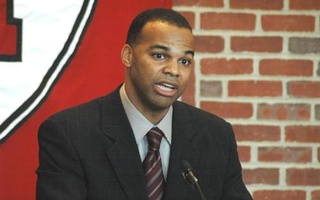Ivel Posada ’14 is a social studies concentrator in Winthrop House. He is the Co-Chair of Harvard's Queer Students and Allies (QSA).
The Boy Scouts of America and the Limits of Free Speech
Yes, but it doesn’t have to be that way. The Boy Scouts of America is, to the best of my knowledge, a private organization funded by members and private donors, and thus the government has no role in dictating decisions regarding its membership. Should it choose to, BSA should have the right to discriminate among its leaders and members according to its founding principles, provided it does so without actively harassing people outside of its contained operations.
However, the questions of should BSA be allowed to and should they are entirely different and must be addressed as such. During my many years as a scout, I met a number of other scouts who did not necessarily fall within BSA restrictions of membership. These people contributed to and gained from the program as much as I did, and certainly left their respective troops better than they found them. The teaching of the principles of scouting to these people certainly follows the BSA’s mission statement: “to prepare young people to make ethical and moral choices over their lifetimes by instilling in them the values of the Scout Oath and Law.”
Clearly BSA believes that the inclusion of homosexuals and agnostics is a violation of the oath’s lines, “to do my duty to God and my country,” and “to keep myself … morally straight.” However, these people’s individual beliefs are antithetical to the oath and law only under the strict lens of conservative Christianity, which set the guiding principles behind the founding of BSA in the early 1900s. That lens should no longer be used to judge the value of potential members because it no longer accurately reflects the moral zeitgeist. I believe that homosexuals, heterosexuals, atheists, agnostics, and believers alike can greatly benefit from the strong foundational principles that govern the scouting experience, and that they can greatly contribute to the program in return. So should BSA be allowed to exclude persons from membership? Yes. But should they? A resounding no.
Daniel Yue ’16 lives in Canaday Hall. He is an Eagle Scout.
Universal Acceptance
Growing up as a Boy Scout, I never thought my ability to join this organization was based on a “freedom of association”; the only thing that concerned me was making friends and having fun. One year removed from my Eagle Scout ceremony, it saddens me to think that boys as young as six will be prevented from joining this organization due to their beliefs. Although the Supreme Court declared in 2000 that the Boy Scouts of America has the freedom to ban members whose beliefs conflict with the organization’s “expressive message,” the continuation of this policy in no way benefits Scouts or Scouters. If the BSA’s mission statement states that the goal of Scouting is “to prepare young people to make ethical and moral choices,” then the continued exclusion of members from Scouting contradicts this essential goal. By preventing prospective Scouts from expressing their identity, this policy inhibits the development of each and every Scout. The preparation these young men go through does not happen in a vacuum; it occurs through exposure to others, regardless of race, sexuality, or religion. Rather than adopt a universal policy barring membership, the BSA should instead attempt to foster a sense of community and acceptance.
When I first joined the Boy Scouts of America, I was just a shy first grader who wanted to make some friends. Throughout my years in this organization, I learned more through exposure to my peers than I did by practicing knots or lashings. Recently, the BSA decided to reconsider its ban on openly gay members. Hopefully this organization will honor its rich history by removing not only its ban on gay Scouts, but removing all membership restrictions, creating an accepting environment for all.
Sam Reynolds ’16, a Crimson editorial writer, lives in Grays Hall. He is an Eagle Scout.
Freedom to Discriminate
Although, as the Chief Executive of the Boy Scouts of America claims, all organizations have the right to membership criteria, these criteria should not be based upon inherent conditions over which a person has no control. Freedom of association should not extend to the ability to discriminate, especially when a group has “quasi-official status,” which the BSA benefits from, according to legal scholar Andrew Koppelman. By excluding people on the basis of sexual orientation, gender, race or disability status, the organization in question perpetuates social stigmas and sends the message that those excluded are inferior. These messages are not only detrimental to those excluded but also to the members of this organization, as they are implicitly associated with discrimination at the very least and may be more susceptible to biases. For this reason, the admissions criteria for youth organizations should be held to a much higher standard.
Youth organizations can be highly influential in the lives of children and can have a large impact on their perspective later in life. As such, any prejudices transmitted to children at this formative period of their lives will most likely influence their actions in one way or another for a large portion of their lives. According to an article from Rolling Stone, LGBT Scouts often experience identity crises. Conversely, Scouts may grapple with their own prejudice as a result of BSA’s policies. Currently, LGBT teenagers face high levels of discrimination at the hands of their peers, which could be exacerbated by the exclusion of LGBT members on the grounds that they cannot comply with the organization’s moral values. As the effects of exclusionary policies negatively affect all of society, they should be banned.
Theodore Longlois ’16 lives in Greenough Hall.
Out of Hopeful Green Stuff Woven
Read more in Opinion
James Russell Lowell by Daniel Chester FrenchRecommended Articles
-
 Celtics Keep Their Eye on Lin
Celtics Keep Their Eye on Lin -
 "Rush Hour 4: Bring on the Funk"
"Rush Hour 4: Bring on the Funk" -
 Amaker Not Going Anywhere
Amaker Not Going Anywhere -
Renouncing Your MedalsYet, while the debate raged on, there was one group that actually made a statement. Not by talk or media campaigns, but by the simple act of saying: “I want no part in this.” I am talking, of course, about the Eagle Scouts who returned their medals to the BSA, renouncing their claim to the title, in light of the organization’s prohibition against gay members.
-
Picking the Right Party BusIf you’re looking for more than a generic HSA ride to The Game, going in club or house-specific buses might ...
-
Juszczyk Catches Kiper's EyeSenior Kyle Juszczyk may have made his mark for the Crimson as Harvard’s all-time leader in receptions (125), receiving yards ...













